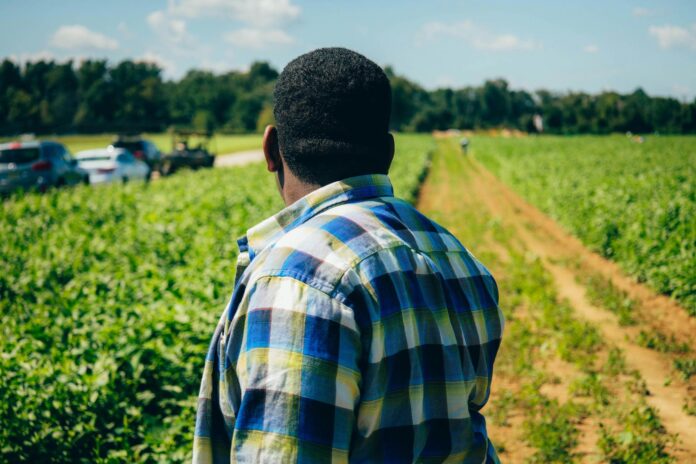
Will Edmond, vegan chef and travel content creator, had had enough. After spending 13 years living in Atlanta and a couple of years in Louisiana, he decided it was time for a change. It was time to return to his roots.
“Cities are becoming more stressful,” Edmond, 39, tells Word In Black. The appeal of urban living has declined for some due to the traffic, crime, and the rising cost of living. “I know my family has land back in East Texas. I can go back, clean it up, get it together, and build some unique structures on it. And that’s what led me here.”
In 2022, Edmond and his partner, Austyn Rich, moved back to Edmond’s ancestral hometown in East Texas, also known as Piney Woods. It’s a rural area known for its beauty, pine trees, lakes, and nature trails. And it’s here that Edmond’s family land — a whole 45-acres passed down through generations — is located.
But this experience, where Black folks keep land in the family, is rare.
Financial experts frequently laud homeownership as the key to wealth building. Yet, the Black homeownership rate has never been above 50% — a level other ethnic and racial groups have reached and surpassed. For the Black community, the loss of land and property contributes to the widening homeownership gap and the even wider racial wealth gap.
“The immediate cause of home loss is the lack of estate planning,” says Nketiah “Ink” Berko, an equal justice works fellow at the National Consumer Law Center. “Either someone didn’t write a will, or maybe they did, but in the will, they left the home to five or six people. And by doing that, they’ve fractured the homeownership interests in the property.”
According to a 2022 Consumer Reports survey, one in three Americans has a will, but 77% of Black Americans lack one.
Estimates vary on the exact amount of Black-owned land lost. The Land Trust Alliance, a land conservation advocacy organization, estimates that between 1865 and 1919, Black folks in the South owned 15 million acres of land. By 2015, Black Americans had lost 97% of their land.
The American Bar Association offers a similar statistic: between 1910 and 1997, Black farmers and families lost more than 90% of the 16 million acres they owned — and the organization considers that to be a conservative estimate.
Splitting Land Between Family
Berko says that land initially divided by a few children can become further divided by several grandchildren and even more so by subsequent generations. This division, known as “heirs property” or “tangled title,” creates challenges and difficulties in maintaining and keeping the property within the family.
This phenomenon also affected Edmond’s family. “My family, we own about six acres, and then my cousins up the street own some of the land as well,” he says. “We have all of the land still in our family to this day.”
On his father’s side of the family — which also owns a lot of land — a relative sold off their portion. Selling is one way to lose land, but other ways are incredibly burdensome to families.
A National Consumer Law Center report co-authored by Berko highlights laws and policies that could protect, resolve, or prevent heirs property. According to the report, heirs property owners are at greater risk of property tax lien foreclosure and frequently miss out on benefits or disaster relief.
Or, mortgage companies may refuse payments from “people who are not the borrower, refuse to provide information about how much is owed, and refuse to consider heirs for loan modifications or other foreclosure avoidance options,” according to the report.
“A lot of people lose their land for $4,000 because nobody in the family can agree to even pay anything on it, and then they lose it,” Edmond says. “Well, you only owe that much on it, and the land was worth $100,000. Now somebody else has it. I see that a lot around here.”
Tax and mortgage foreclosures leave families vulnerable to investors who offer to purchase the property for much less than it is worth, adding to the racial wealth gap.
Keeping it in the Family
In 2023, Edmond, Rich, and their family members turned the abandoned land into a homestead and “glamping” destination called Glamping Remote. When the project was complete, they shared their story publicly.
Edmond says it was important for him to share his journey and his family’s story because it can serve as an example of what’s possible for Black people. With it being unlikely that houses and property will get cheaper, Edmond believes if people can work with the property in their family or help pay the property taxes, they should.
“If people want to have any type of wealth or to hold on to land that’s been passed down from generation to generation, they need to come back to their grandfather’s and uncle’s land,” he says. “Land is something that’s only made one time.”



